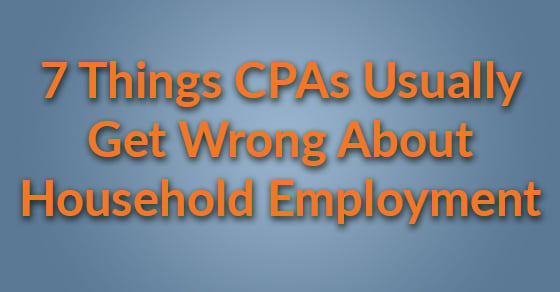
At HomeWork Solutions we regularly consult with CPAs and other financial professionals about household employment. The most common questions we get go something like: “I have a client that hired a nanny and I don’t know what to do,” or, “If I remember my payroll class right from college I can just use a 1099 for this, right?” We’ve put together 7 things to know when a client brings this issue to you.
Form W2 not 1099
IRS Publication 926 clearly states that household workers are employees, not independent contractors. If you can specify the work to be done, how to do it, and when, then the worker is your employee. For an official determination from the IRS, you may submit Form SS-8. Even if a nanny works for multiple families, they are most likely an employee of each family. As an employer, the family should be paying employment taxes and filing a W2. The household employee should not receive a 1099 and should not be paying self-employment tax. That would be worker misclassification, and that could leave your client exposed to penalties and fines.
1040ES Payments not 941
Lots of people think setting up an LLC to pay a household employee is a good idea. It isn’t. Household payroll taxes are properly reported on an individual’s personal tax return. The FEIN is established as a sole proprietorship specific to household employment. Setting up another kind of entity such as a Trust or LLC is not a best practice; it will likely be more expensive and not provide the protections an employer might expect, as family members interacting with the employee still have exposure to the risks of any employer. A household employer FEIN exempts you from having to file a business return. That means no 941s or 940s. Quarterly payments are done through 1040 Estimated payments or the Electronic Federal Tax Payment System (EFTPS), if needed.
1040 Schedule H and Year End Summary
As mentioned above, household employment taxes are reported on a personal tax return. This is done using Form 1040 Schedule H. This document shows the total tax obligation of a household employer for the year. If 1040ES payments were made, the taxpayer would take credit for them on their Form 1040. If not, federal employer taxes would be due with the annual filing. HomeWork Solutions provides an Employer Year End Summary to our clients for this purpose.
Do Not Add a Household Employee to a Business Payroll
Many business owners are tempted to put a household employee on their business payroll, thinking it will make things easy. This actually causes extensive accounting headaches because that household employee cannot be treated as a business expense and would have to be backed out of all accounting. There would also need to be a separate workers’ compensation policy as the household employee would not be covered under the company policy.
Household Employees should be Paid On-The-Books
This really should go without saying, but paying a household employee on the books is beneficial to both the employer and employee. It offers protections like unemployment insurance and workers’ compensation, it provides Social Security/Medicare benefits to the employee, and it is the law. We have much more information about this here.
Paying Half-On and Half-Off the Books
This is sometimes seen as an appealing way to cut some of the cost of having a household employee. We’ve even seen employees asking for this method so that they don’t have to report their total wages and can still qualify for income-based assistance programs. The risk here is that an employer is exposed when a former employee files an unemployment claim for their full wage. Even those who ask to not have all their wages reported may still report their full earnings when filing for unemployment, and this may trigger an audit and significant consequences.
Pay Back Taxes
There are quarterly and annual wage thresholds that need to be met before employment taxes come due. That said, once thresholds are met, taxes are due back to the first dollar paid. This is true even for prior quarters or years. Not paying back taxes carries with it all the risks and issues mentioned above.
Household employment is a narrow but deep piece of the tax code with specific procedures and carve outs. We’ve been helping families and financial professionals navigate these issues for over 25 years and are happy to answer any questions you or your clients’ have.
